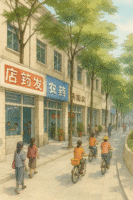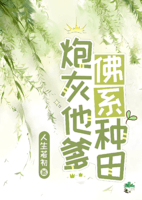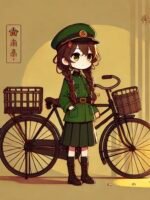I Have A Store C136
by MarineTLChapter 136: Mushroom Seeds
When the old Party Secretary heard that Zhou Yimin was planning a 60th birthday celebration for his grandmother—and from the looks of it, he was going to do it properly—he couldn’t help feeling a twinge of envy.
Compared to his own grandson, who was basically a useless mess, this was a stark contrast. His own grandson couldn’t even remember his birthday, let alone help plan a celebration.
Might as well go to bed early tonight—maybe he’d dream of something better.
“Hm! So how are you planning to celebrate?” the old Party Secretary asked.
Since Yimin brought it up to him, it meant there was a role for him to play.
“Actually, I just want to invite some respected elders in the village, along with anyone over sixty, and host them for a couple of meals. I might need a few people to help out when the time comes,” Zhou Yimin said.
For the old Party Secretary, that was no big deal.
“Alright, I’ll help you put together a list and notify them later. Oh right—Zhicheng’s in-laws should be the right age too. Want to invite them?”
That was a bit of a special case.
Strictly speaking, they weren’t originally from Zhoujiazhuang, but since they were planning to settle and retire there, it made sense.
“Yeah, invite them. Two more won’t hurt.”
“Alright. If you need help from anyone, just say the word.” No one was likely to refuse anyway.
Afterward, everyone carried the eggs into the hatchery.
Under everyone’s curious and skeptical gazes, Zhou Yimin carefully placed each egg on the racks in the hatchery, neatly and precisely, as if they were standing at attention.
“This is it?” someone asked.
Zhou Yimin shook his head. “Of course not. You can start lighting the fire in the stove outside. During the day, it doesn’t need to be too hot, but at night, when the temperature drops, you’ll need to turn it up a bit.”
He had someone light the fire, then took out a thermometer and placed it in the hatchery.
He told everyone what temperature needed to be maintained, and that if it dropped below a certain level, the fire needed to be stoked.
“Got it?”
They were all familiar with thermometers—doctors used them, after all.
“Yeah! Uncle Sixteen, we got it.”
They didn’t understand the exact science behind it, but the operation itself was simple enough.
Hatching chicks this way mainly just consumed firewood. As long as someone was always watching the thermometer, it wasn’t a problem—just add more fire when needed.
The old Party Secretary assigned three people to take turns keeping watch.
Raising chickens was a key step in the village’s journey toward prosperity—it couldn’t be treated lightly.
After that, Zhou Yimin and Zhou Zhihong went up the mountain to check on the fencing and the progress of building the sheds.
Unfortunately, plastic sheeting was hard to come by these days. It would’ve made things a lot easier.
Not that it didn’t exist—many time travelers took pride in greenhouse planting, but the country had already begun experimenting with that years ago.
Four years ago, in 1956, the Ministry of Agriculture set up a research team to study the structural performance of traditional Chinese sunken beds and improved greenhouses, along with vegetable cultivation techniques. These were promoted in large and mid-sized cities across the north, helping to improve winter and spring vegetable supply to some extent.
You might not have heard of “sunken beds.”
Basically, they’re pits—evolved from windbreak beds. They use solar energy to maintain internal temperature without artificial heating, so they’re also called “cold beds.” There are two main types: ridge and trough beds.
Because they’re easy to build, low-cost, and simple to use, they remained one of the go-to methods for early spring seedling cultivation of melons and vegetables even in modern times, especially in areas where greenhouse tech wasn’t very advanced.
Two years ago, in 1958, domestically produced agricultural polyethylene film began to be used for small shed coverings and saw some adoption.
Zhou Yimin thought that if he ever got the chance, he’d definitely need to get his hands on a batch of that film.
“Yimin, how do you grow mushrooms?” Zhou Zhihong finally couldn’t hold back his curiosity.
In their understanding, mushrooms were wild things—you wanted some, you went to pick them in the wild. No one had ever imagined you could actually cultivate mushrooms.
The problem was… mushrooms didn’t even seem to have seeds!
“The first step is preparing the mushroom house, which is what you’re all working on now. It must be airtight and, ideally, able to retain heat and moisture.
Next is composting the substrate—in plain terms, fertilizing. The main ingredients are livestock manure, wheat straw, bran, rice straw, corn stalks, and so on.
That’s why raising chickens is so important—it’ll provide manure later on.
After that, it’s time to inoculate,” Zhou Yimin explained.
For shiitake mushrooms, the process is a bit different.
Before planting, you need to prepare spawn bags. They’re not too difficult to make—choose oily woods like pine or cypress, grind them into sawdust, mix with water, gypsum, and bran, then bag it all up.
Then you inoculate the bags with spawn, control the temperature and humidity, spray water daily, and ensure good ventilation. The shiitake mushrooms will naturally start growing.
Zhou Zhihong asked, “How do you inoculate mushrooms? I’ve never seen their seeds.”
“Mushrooms don’t have seeds. They reproduce through spores—those tiny particles on the surface of the mushroom, usually not visible to the naked eye.
You can place a mature mushroom on a sheet of white paper and give it a few gentle taps. You’ll see brown spores fall onto the paper.”
Zhou Zhihong, seeing how confidently Zhou Yimin explained it all, no longer doubted or worried.
He’d just been concerned that Zhou Yimin might make a big show of things and end up with nothing to show for it, becoming the village laughingstock.
After inspecting everything, Zhou Yimin gave a few more instructions and then headed home.
Back in Xinghua Village, after lunch, Zhou Xuqing and his wife were preparing to return home. They didn’t plan to stay the night.
“Not even staying one night?” Huang Lan’s mother was reluctant to part with her daughter.
“Mama! There’s plenty to do at home. We’ll come again next time.” Mostly, they had to go back to take care of the kids—couldn’t be away too long. She was already satisfied just visiting her parents today.
“Alright, then come again when you’re free next time.”
As she spoke, she slipped some money into her daughter’s hand.
The corn, canned goods, and cured duck had all been delivered by her son-in-law’s nephew, and while no money had been asked for, they still wanted to reciprocate a little—just as a matter of propriety. They didn’t want to make things awkward for their daughter and son-in-law.
What if the nephew had brought those things just to save face? If they accepted everything without offering anything in return, it would be hard to explain later.
“Mama, what are you doing? Take it back.”
“Just keep it. Being able to buy food with money these days is already rare.”
She wasn’t wrong. Supplies were scarce, especially food. Even if you had money, you couldn’t necessarily buy it. Rural folks weren’t the only ones suffering—rumor had it that urban ration quotas were dropping again and again.
“Alright, you two better get going. We won’t keep you.” Zhou Xuqing’s father-in-law finally spoke up.
Watching his brother-in-law ride away on a bicycle, Zhou Xuqing’s two brothers-in-law looked on with envy.
“Little Sis’s family won’t have to worry about anything from now on.”
They’d gotten close with a very capable nephew.
“Mama, in a few years, when Weibing grows up, do you think we could ask Little Sis to put in a word with her nephew, see if he could…”
Before the daughter-in-law could finish, old man Huang narrowed his eyes and said, “What are you thinking? You think work placements are handed out like candy? The only reason he helped Laifu and Laicai is because they’re his brothers.”
Not by blood, true, but it didn’t make much difference.
As for their family, what connections did they have? They were one layer removed.
(End of Chapter)








![Cannon Fodder Refuses to Be a Stepping Stone for His Cub [QT] Cover](https://marinetl.xyz/wp-content/uploads/2025/06/228114s_x16_drawing-143x200.png)

0 Comments